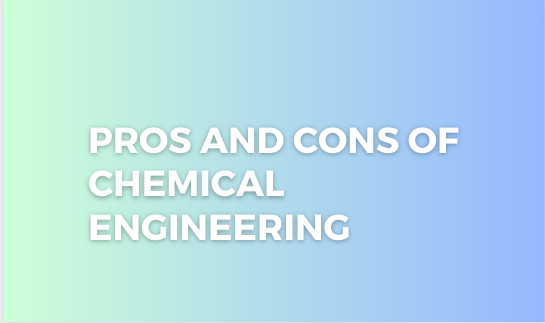Chemical engineering is a diverse and challenging field that encompasses various industries and applications. Below are pros and cons of chemical engineering:
- Versatile career opportunities: Chemical engineers can work in a wide range of industries, including pharmaceuticals, energy, materials, and environmental sectors.
- High demand for professionals: The demand for chemical engineers remains strong, offering abundant job opportunities.
- Competitive salaries: Chemical engineers often receive competitive salaries due to the specialized skills and knowledge they possess.
- Problem-solving skills: Chemical engineering develops strong problem-solving skills that can be applied to various technical and non-technical challenges.
- Collaborative work environment: Chemical engineers often work in multidisciplinary teams, fostering collaboration and knowledge exchange.
- Intellectual stimulation: The field of chemical engineering involves complex processes and technological advancements, providing continuous intellectual stimulation.
- Continuous learning and innovation: Chemical engineers must stay updated with emerging technologies and scientific advancements, promoting lifelong learning.
- Global relevance: The principles and applications of chemical engineering have global significance, making it a globally recognized profession.
- Positive impact on society: Chemical engineers contribute to the development of sustainable processes, clean energy solutions, and advancements in healthcare.
- Environmental sustainability: Chemical engineers play a crucial role in developing and implementing environmentally friendly processes and technologies.
- Transferable skills: Chemical engineers acquire a wide range of transferable skills, including data analysis, project management, and risk assessment.
- Career advancement opportunities: Chemical engineers can pursue managerial or leadership roles as they gain experience and expertise.
- Continuous professional development: The field encourages professional growth through conferences, workshops, and industry-specific certifications.
- Technological advancements: Chemical engineering is closely tied to technological progress, offering exposure to cutting-edge developments.
- International opportunities: Chemical engineers often have opportunities to work on global projects or collaborate with international teams.
- Dynamic work environment: The field presents diverse and challenging projects, ensuring a stimulating and ever-changing work environment.
- Research and development: Chemical engineers contribute to scientific research and development of new materials, processes, and technologies.
- Analytical skills: Chemical engineers develop strong analytical skills through data analysis, experimentation, and process optimization.
- Contribution to healthcare: Chemical engineers are involved in the development of pharmaceuticals, medical devices, and healthcare technologies.
- Public safety focus: Chemical engineers prioritize safety protocols and risk assessment to ensure the safety of processes and products.
Cons:
- High academic rigor: Chemical engineering programs require extensive coursework and a strong foundation in mathematics and science.
- Competitive job market: The field of chemical engineering can be highly competitive, with a large number of qualified applicants for limited positions.
- Long working hours: Chemical engineers often work long hours, including evenings and weekends, especially during critical project phases.
- Challenging work environment: Chemical engineering can involve working in hazardous conditions or with potentially dangerous substances.
- Stressful deadlines: Meeting project deadlines and ensuring production efficiency can create high-pressure work environments.
- Continuous learning: Chemical engineers need to constantly update their knowledge and skills to keep up with advancements in technology and industry standards.
- Physical demands: Some chemical engineering tasks may require physical exertion, such as equipment maintenance or process troubleshooting.
- Exposure to chemicals: Chemical engineers may face health risks due to potential exposure to toxic or hazardous substances.
- Ethical considerations: Chemical engineers need to navigate ethical dilemmas related to environmental impact, safety, and public health.
- Limited creativity in certain roles: Some chemical engineering positions may involve repetitive tasks or adherence to strict protocols, limiting opportunities for creativity.
- Limited job mobility: The specialized nature of chemical engineering can limit job opportunities in locations with fewer industrial facilities.
- High responsibility: Chemical engineers often have a high level of responsibility, as their decisions and actions can impact public safety and the environment.
- Continuous pressure for efficiency: Chemical engineers are often tasked with finding ways to optimize processes and reduce costs, which can create ongoing pressure.
- Limited work-life balance: The demanding nature of chemical engineering can make it challenging to maintain a healthy work-life balance.
- Potential for high stress levels: The combination of technical complexities, project demands, and safety considerations can lead to increased stress levels.
- Limited opportunities for specialization: In some industries, chemical engineers may have limited opportunities to specialize in specific areas of interest.
- Regulatory compliance challenges: Chemical engineers must navigate complex regulations and compliance standards related to safety and environmental impact.
- Financial considerations: Some chemical engineering projects require significant financial investment, and managing budgets can be challenging.
- Limited public understanding: The work of chemical engineers may not be well understood by the general public, leading to misconceptions or underappreciation.
- Limited recognition: Despite their contributions, chemical engineers may receive less recognition compared to professionals in other fields.
Pros
- Versatile career opportunities
- High demand for professionals
- Competitive salaries
- Problem-solving skills
- Collaborative work environment
- Intellectual stimulation
- Continuous learning and innovation
- Global relevance
- Positive impact on society
- Environmental sustainability
- Transferable skills
- Career advancement opportunities
- Continuous professional development
- Technological advancements
- International opportunities
- Dynamic work environment
- Research and development
- Analytical skills
- Contribution to healthcare
- Public safety focus:
Cons
- High academic rigor
- Competitive job market
- Long working hours
- Challenging work environment
- Stressful deadlines
- Continuous learning
- Physical demands
- Exposure to chemicals
- Ethical considerations
- Limited creativity in certain roles
- Limited job mobility
- High responsibility
- Continuous pressure for efficiency
- Limited work-life balance
- Potential for high stress levels
- Limited opportunities for specialization
- Regulatory compliance challenges
- Financial considerations
- Limited public understanding
- Limited recognition:


